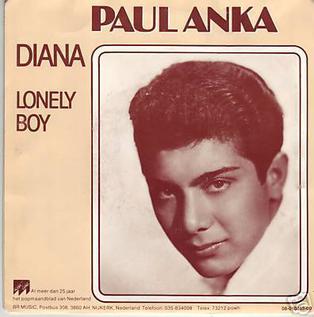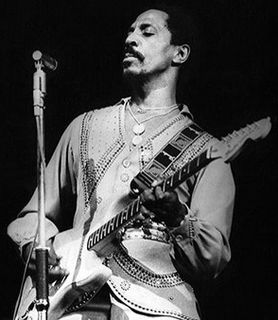Related Research Articles
Ozark Jubilee is a 1950s United States network television program that featured country music's top stars of the day. It was produced in Springfield, Missouri. The weekly live stage show premiered on ABC-TV on January 22, 1955, was renamed Country Music Jubilee on July 6, 1957, and was finally named Jubilee USA on August 2, 1958. Originating "from the heart of the Ozarks", the Saturday night variety series helped popularize country music in America's cities and suburbs, drawing more than nine million viewers. The ABC Radio version was heard by millions more starting in August 1954.

"Jailhouse Rock" is a song recorded by American singer Elvis Presley for the film of the same name. It was written by Jerry Leiber and Mike Stoller. RCA Victor released the song on a 45 rpm single on September 24, 1957 as the first single from the film's soundtrack EP. It reached the top of the charts in the U.S. and the top 10 in several other countries. The song has been recognized by the Grammy Hall of Fame, the American Film Institute, and others.

The Sylvers,, were an American R&B family vocal group from Watts, Los Angeles, California. The Sylvers were a popular act during the 1970s, recording the hit singles "Fool's Paradise", "Boogie Fever", and "Hot Line". Prior to becoming the Sylvers, the four eldest members recorded as the Little Angels, appearing on shows such as You Bet Your Life and Make Room for Daddy, and opening for such acts as Johnny Mathis and Ray Charles. During this time, they released two singles: "Santa Claus Parade" b/w "I'll Be a Little Angel" on Warwick Records and "Says You" b/w "Olympia" on Capitol Records.
Cashbox, also known as Cash Box, was a music industry trade magazine, originally published weekly from July 1942 to November 1996. Ten years after its dissolution, it was revived and now continues as Cashbox Magazine, an online magazine with weekly charts and occasional special print issues. In addition to the music industry, the magazine covered the amusement arcade industry, including jukebox machines and arcade games.

"Angel of the Morning" is a popular song written by Chip Taylor and recorded by many artists, most notably by Merrilee Rush, P. P. Arnold, Connie Eaton, Mary Mason, Guys 'n' Dolls, Melba Montgomery, Olivia Newton-John, Bettye Swann and, most famously, Juice Newton.

"Since I Don't Have You" is a song written and composed by Jackie Taylor, James Beaumont, Janet Vogel, Joseph Rock, Joe Verscharen, Lennie Martin, and Wally Lester. It was first a 1958 hit single for the doo-wop group the Skyliners on the Billboard Hot 100. Country music singer Ronnie Milsap had a hit with the song in 1991. American hard rock band Guns N' Roses also had some success in 1994 with their version of the song which reached the top 10 on the UK Singles Chart.

"Diana" is a song written and first performed by Paul Anka, who recorded it in May 1957 at Don Costa’s studio in New York City. Anka stated in his autobiography that the song was inspired by a girl named Diana Ayoub, whom he had met at his church and community events, and had developed a crush on. Session musicians on the record included Bucky Pizzarelli on guitar, Irving Wexler on piano, Jerry Bruno on bass, and Panama Francis on drums. The song was recorded in May 1957 at RCA Studios in New York. Backup singers included Artie Ripp.

"Take Good Care of My Baby" is a song written by Carole King and Gerry Goffin. The song was made famous by Bobby Vee, when it was released in 1961.
"Don't Turn Around" is a popular song written by Albert Hammond and Diane Warren. It was originally recorded by Tina Turner as the B-side to the single "Typical Male" in 1986. It has since been included on the rarities disc of the 1994 compilation The Collected Recordings – Sixties to Nineties, as well as featuring in the Tina musical in 2018.

"Raunchy" is an instrumental by American rock and roll artist Bill Justis, co-written with Sidney Manker and produced by Sam Phillips. The tune, from the album Cloud 9, was released as a single on the record label Phillips International Records, a sub-label of Sun Records, on September 23, 1957.

This article contains information about albums and singles released by American R&B duo Ike & Tina Turner.

Stanley Beresford "Donn" Reynolds was a Canadian country music singer and yodeler most widely known for his Bavarian style of yodeling. Often referred to as Canada's "King of the Yodelers", Reynolds established two yodeling world records. He recorded 38 singles and six albums throughout a performing career spanning over 40 years.
Wilmer "Bill" Browning was an American Rockabilly musician, recording studio and songwriter.

"So Sad " is a song written by Don Everly, which was released by The Everly Brothers in 1960. The song was later a country hit for multiple artists in the 1970s and 80s.
"Long Lonely Nights" is a song that was originally released by Lee Andrews & the Hearts in 1957. Hit versions were also released by Clyde McPhatter, later in 1957, and Bobby Vinton in 1965. The song was written by Lee Andrews, though Larry Brown, Doug Henderson, and Mimi Uniman were given songwriter credit as well, in a practice that was common at the time.
Hecht-Lancaster & Buzzell Music, Inc. was an American music publishing company founded by film producer Harold Hecht, his brother-in-law Loring Buzzell, and Hecht's business partner, actor/producer Burt Lancaster. Hecht-Lancaster & Buzzell Music was solely associated with the American Society of Composers, Authors and Publishers (ASCAP). The three partners also founded the music publishing company Calyork Music, Inc., which was solely associated with Broadcast Music, Inc. (BMI). Hecht, Lancaster and Buzzell also briefly operated their own record label, Calyork Records, which was active in the late 1950s. Hecht-Lancaster & Buzzell Music, Calyork Music and Calyork Records were divisions of Hecht and Lancaster's film production corporation Norma Productions.

This article contains information about albums and singles released by of American musician and bandleader Ike Turner.
Don Lee was a country singer, song writer, producer and guitarist who recorded in the 1960s and 1970s. He had a hit on the country charts with "16 Lovin' Ounces to the Pound". He also wrote a couple more songs that became hits. One became a hit for Jerry Naylor.
Don Lee was an American accordionist, multi-instrumentalist, music teacher, music publisher, record label owner, studio owner and electronics enthusiast who is most remembered for his reverb effect instrumental hit "ECHO, Echo echo" in 1957. He also has a place in Space Age Pop history.
Loring Bruce Buzzell was an American music publisher and record label executive. Together with film producer Harold Hecht and actor Burt Lancaster, he formed a series of music publishing imprints in the middle and late 1950s. His music publishing companies, Hecht-Lancaster & Buzzell Music, Calyork Music, Leigh Music and Colby Music, were responsible for copyrighting, publishing and promoting the soundtracks and theme songs from such notable films as Marty, Trapeze, The Kentuckian, Sweet Smell of Success, Separate Tables, Cry Tough, Take a Giant Step and The Unforgiven. Buzzell's companies also published "May You Always", the recordings of which by The McGuire Sisters for Coral Records and Joan Regan for HMV Records, became the top-selling records and the second-best-selling sheet music in the United States and the United Kingdom for 1959. Calyork Records and Maine Records were two independent record labels operated by Buzzell in partnership with Hecht and Lancaster.
References
- ↑ The Cash Box , June 1, 1957 - Page 35 Record Reviews
- ↑ Global Dog Productions - Discography for Blue Chip Records
- ↑ The Cash Box, June 1, 1957 - Page 35 Record Reviews
- ↑ Lansing State Journal , Sunday, February 9, 1958 - Don Lee's Accordion Career Echoes Back to 8
By ETHELYN SEXTON
(Journal Music Editor) - ↑ The Sydney Morning Herald, Sunday, February 9, 1958 - Page 88
- ↑ Lansing State Journal, Sunday, February 9, 1958 - Don Lee's Accordion Career Echoes Back to 8, VARIATION OF AN IDEA
By ETHELYN SEXTON
(Journal Music Editor) - ↑ The Cash Box , July 13, 1957 - Page 40 R & B Ramblings, NEW YORK
- ↑ The Billboard , August 19, 1957 - Page 34 D.J.'s-Hot Tips on HotHits from Jubilee!
- ↑ The Billboard, September 9, 1957 - Page 50 the hits are on jubilee
- ↑ Evansville Courier & Press , Nov. 06, 2015 - MR. MUSIC for Nov. 6